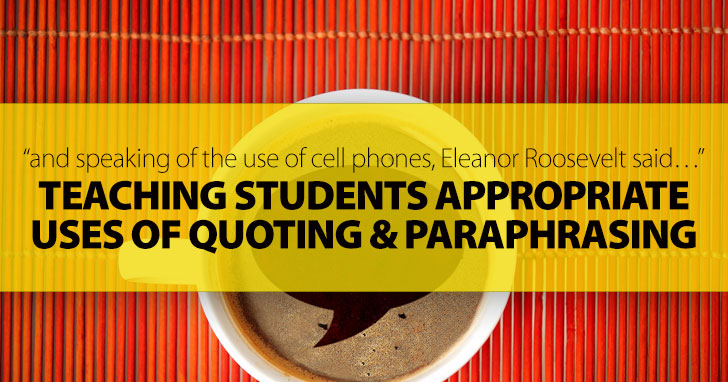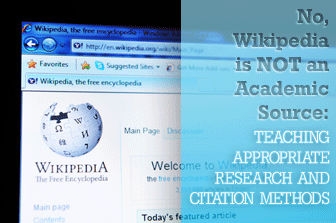And Speaking of the Use of Cell Phones, Eleanor Roosevelt Said…: Teaching Students Appropriate Uses of Quoting and Paraphrasing


I have a required number of sources, so students apparently sometimes “pad” their numbers. But I think there is something else going on here. Students have the entire Internet at their disposal, after all, so certainly they can find more appropriate sources. But that may just be the problem: what’s an appropriate source? Students today are exposed to an unprecedented glut of information, and have no way to evaluate it. It becomes our job to teach them how, and this is teaching the research process itself.

Encourage students to choose their own topics (within reason): something they have an interest or even passion in. This passion will carry them through the research process, which can be challenging, in a way that researching something they don’t care about will not. And this is more authentic to the task, in any case. Why do professionals conduct research? Because they want to find out more about a topic. That should be students’ reason, as well.
At the beginning of a research project, I always bring in a bag of print materials from home, everything from Time magazine to Applied Linguistics, and spread it out. Which sources are popular? Which are academic? Time is popular: it has no citations from experts, was written by staff writers, and has advertising. However, Applied Linguistics has no advertising but has citations and was written by contributing writers so is scholarly. Have students evaluate some material on their own and share their judgments with the class. See if they can agree that their papers should mostly cite scholarly work.
Also discuss places to locate scholarly articles: Google may not be the best way. An example I like to give is from my own experience doing some research on The Holocaust. If you Google “Holocaust,” perhaps millions of search results come up, many of them are the home pages of hate groups whose mission is Holocaust denial. However, if you use a more select search engine like Academic Search Premier, available through many universities, most of the hits you get, while smaller in number, will be the work of scholars writing in their area of expertise. It is much better to get a select group of articles you can actually use than a lot of material of dubious quality.
Often students are at a loss on how a research paper is put together. I like to tell them it is much like the essay format they have already learned, although this time they are supporting their theses with research rather than personal experience. So, if, for example, I’m supporting a thesis that learning to play a musical instrument has numerous positive effects on academic performance, I would not rely on my personal experience to support this thesis. I’ll need research from experts in music education.
I might, however, use an anecdote from my experience to open the essay, much as I would in a more usual essay, and in the conclusion I would still summarize my main points. The major difference in content is the addition of research.
Another major difference between research writing and other writing students have done is the language. The tone of a research paper is more formal. The focus is on the research and its process and is therefore more impersonal. The use of the “I” voice is discouraged. In addition, the passive voice is used a lot because of this focus on process over the personal. It is helpful, when working on a research paper, to review the various tenses of the passive voice with your class.
It’s also good when teaching the research paper to spend a day or two on standard MLA or APA format. I’ll go over in-text citations, how to set up the bibliography, and let students pick which format they’d like to use, as long as they don’t mix them up. I tell students that I consider learning MLA/APA a developmental process, and I don’t count errors and subtract points but rather look for general correctness and whether a reader could locate students’ sources if she desired-- a major purpose of citing.

Many students have never really seen a completed research paper. Imagine constructing a dress with no idea or model of what the finished product is supposed to look like. I’d refuse to do it. So I like to start the research process by pulling out one of my old research papers, showing its different components, discussing the process I went through in writing it, and passing it around. Even if they don’t really understand the model paper’s topic, students now have a sense of the construction of the paper.
Teaching students effective use of keywords is important because, as in my “Holocaust” example, student will often do a broad search that yields too many sources to sift through: “more” is not “better.” Teaching students to narrow their topic with the use of “and”—for example, “Holocaust and the United States” will narrow the search to just those sources that mention both the Holocaust and the U.S., focusing then on the U.S. role. This gets students to focus their topics at the same time.
Many students have never been to a library—perhaps in their lives, having grown up in the digital age. Librarians can help students with not only locating sources but also on the research process itself, what the library’s databases are, and how to search them.
But the value yielded in exciting students about the research process and drawing them into the academic world is worth the effort.
Do you teach the research process? What are some ways you teach it?


